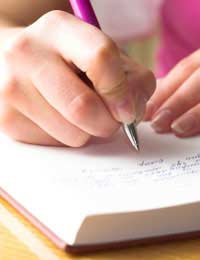Forming Plural Nouns in English

Nouns are words that refer directly to something, an idea or a person. An English noun also tells us who, or what something is.
There are different types of nouns that are used within the English language, and we will look at these before looking at how to make nouns plural.
Types Of Nouns
- Common Nouns – words such as chair, bed, cat and dog are common nouns.
- Countable Nouns – Countable nouns are the words that refer to something that can be counted. So, words that can be made into plural are countable, and words that only have a singular form are uncountable nouns. Rice is an uncountable noun as there is no plural form. Book is a countable noun – one book, two books and so on.
- Collective Nouns - The nouns that refer to a group of things or people are known as collective nouns. So, chairs, bookcases, tables and so on are known as furniture. Furniture is the collective noun.
- Proper Nouns – Proper nouns are nouns that refer to places, countries, organisations and people. Proper nouns are always capitalised. For example, England, France and Germany are all proper nouns.
- Compound Nouns – compound nouns are nouns that are made up of more than one word. For example, the word toothpaste is a compound noun as it is made up of two separate words – tooth and paste.
- Gerunds – These are nouns formed from a particular verb when the suffix ‘ing’ is added to the end.
Making Nouns Plural
Most nouns have a plural form, and to make some nouns plural you simply add an ‘s’ onto the end of the word.- Candle – Candles
- Dog – Dogs
- Cup – Cups
- Table – Tables
However, for nouns that end in the letters ‘ch’, ‘x’, ‘s’, and ‘sh’, you will need to add ‘es’ to the end of that particular noun.
- Church – Churches
- Crash – Crashes
- Box – Boxes
- Bus – Buses
For nouns that end in the letter ‘z’, you will need to add ‘zes’ to make it a plural form.
- Quiz – Quizzes
There are some nouns that end a consonant followed by the vowel ‘o’. In most cases, to make these nouns plural, you will have to add ‘es’ without sacrificing any of the other letters of the original noun.
- Potato – Potatoes
- Volcano – Volcanoes
- Tomato – Tomatoes
However, there are certain exceptions to this rule. Some more modern words, and those words that have a Spanish/Italian origin that end in the letter ‘o’, just need to have an ‘s’ added to the end.
- Photo – Photos
- Portico – Porticos
- Piano – Pianos
Nouns that end in the letter ‘y’ will need to lose the ‘y’ and gain the suffix ‘ies’.
- Puppy – Puppies
- Doggy – Doggies
- Party – Parties
- Lady – Ladies
Irregular Plurals
Some nouns in the English language cause confusion to many. Some nouns cannot be counted in any of the above plural rules, therefore causing problems to learners. Some irregular plurals are below:- Child – Children
- Foot – Feet
- Mouse – Mice
- Person – People
- Tooth – Teeth
Some nouns have the exact same spelling for both the singular form and the plural form. However, they do still have other plural forms that are considered correct.
- Fish – Fish – Fishes. “Look at that fish.” “Look at those fish.” “Look at those fishes.”
Being able to correctly identify how to make certain nouns plural makes it much easier to communicate your ideas, thoughts and feelings. Fluency is very important when learning English as a native speaker, or as someone learning English as a second language. That is why learning the correct plural form of nouns is so important, true fluency.


Re: Why English Grammar Is Important
There are a certain parts that werent.... Or There are certain parts that werent...
Re: Understanding Intonation and Stress in Speech
How much for the intonation e-book? Best regards, Lily
Re: English Language: Silent Letters
@Deb - according to the Cambridge Dictionary, it should be pronounced 'wenz.de', which doesn't sound right - I think…
Re: English Language: Silent Letters
I have never known the "d" in Wednesday to not be pronounced - it should be Wed-nes-day - which is from the Germanic Wodan's…
Re: Using English Verbs, Adverbs and Adjectives
i need to know all the adjectives and verbs for my GCSE exam omg i am sick of exams now they are anoying me
Re: Using English Idioms
I found the contents very useful and relevant to my classroom transations.
Re: What You Will Need to Learn English
i love reading your article it help me to understand how important for me to reading english.. i want to learn english…
Re: How to Write Paragraphs
As a teacher teaching English I find your website helpful. Cheers
Re: Ten Tips to Help You Learn English as a Second Language
The biggest mistake Spanish students make is trying to translate word for word. For example;…
Re: English Language: Silent Letters
A longtime since ive been in grammer school.I will be 80 years old my next birthday, This is a very enlightening ,and helpful…